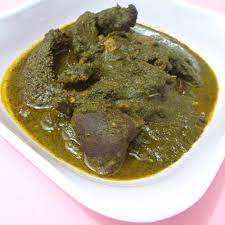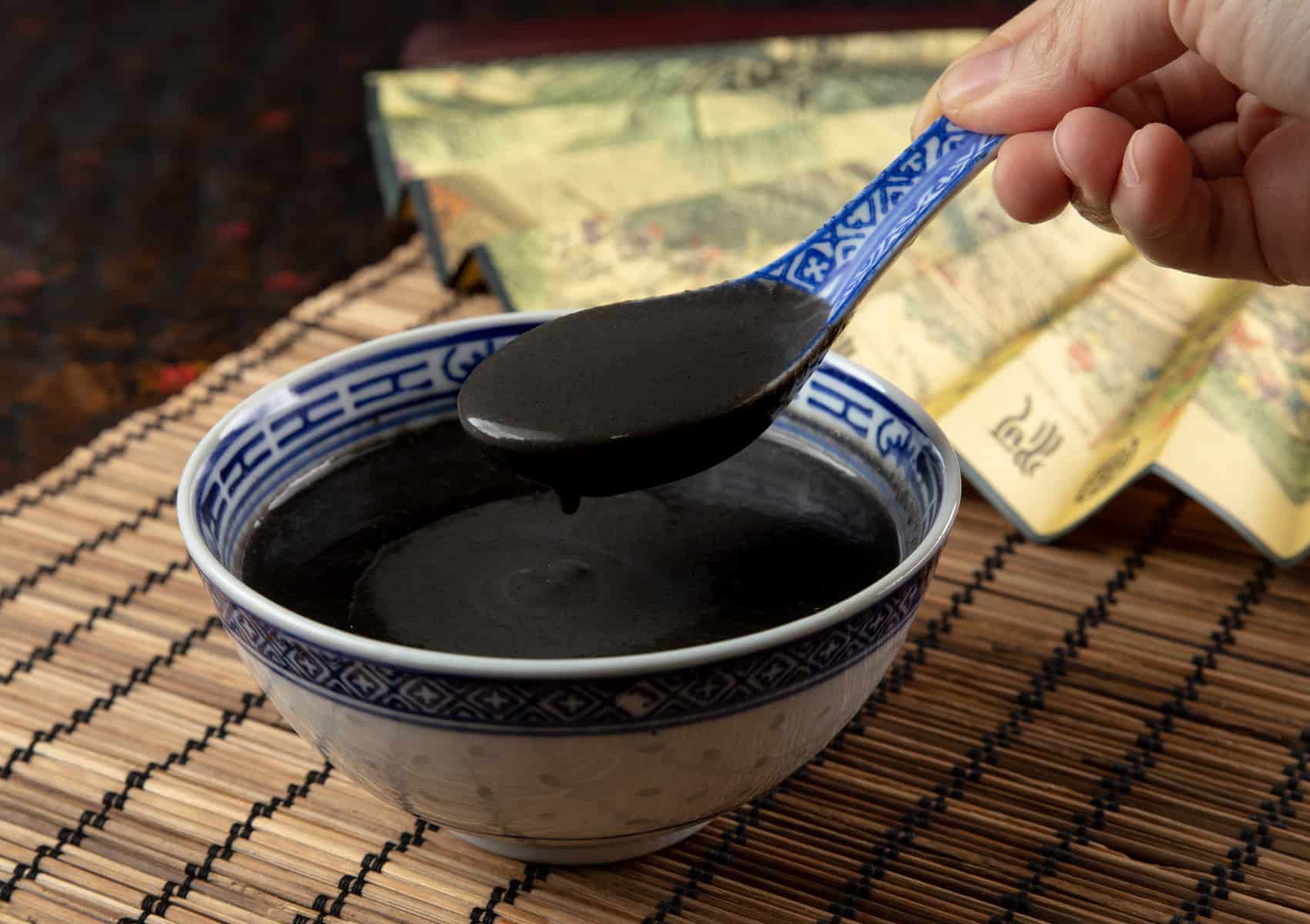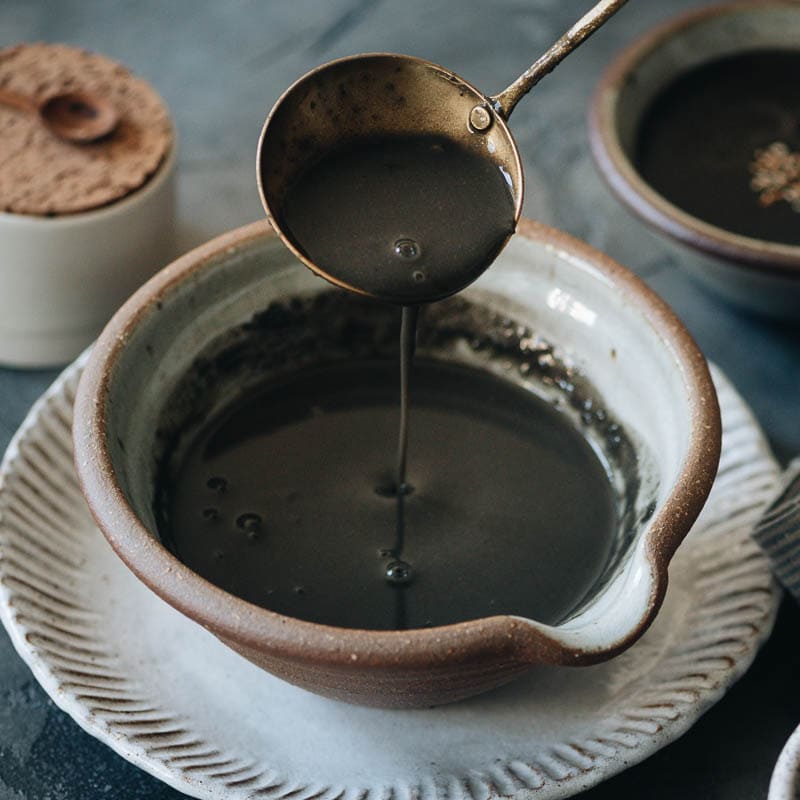Benin Black Soup, also known as Ewedu soup, is a traditional soup from Benin, a country in West Africa. It is a soup made from Jute leaves, which are also known as ewedu in Yoruba language. The soup is often served with pounded yam, which is a staple food in Benin and other parts of West Africa.

Benin Black Soup is a popular dish in Benin and other West African countries. It is known for its unique taste, which is a combination of the slightly bitter taste of the jute leaves and the spicy flavor of the scotch bonnet peppers. The soup is often served with pounded yam, which is made by boiling yam and then pounding it until it is smooth.

Jute leaves, which are the main ingredient in Benin Black Soup, are rich in fiber and have many health benefits. They are a good source of iron, which is essential for the production of red blood cells, and calcium, which is important for strong bones and teeth. Jute leaves also contain vitamins A and C, which are antioxidants that help to protect the body against disease.
Locust beans and crayfish are also important ingredients in Benin Black Soup. Locust beans, also known as iru, add a unique flavor to the soup, while crayfish provides protein and adds a salty taste to the soup. Palm oil is also used in the soup, which gives it a rich, deep flavor and a distinctive red color.

When preparing Benin Black Soup, it is important to use fresh ingredients to ensure the best flavor. The jute leaves should be thoroughly washed and chopped before being cooked in water. Once cooked, they should be mashed until smooth. The onion, scotch bonnet peppers, crayfish, and locust beans should be added to the pot and cooked until tender. Finally, palm oil and salt should be added to the soup and cooked for an additional 5-10 minutes on low heat.
In conclusion, Benin Black Soup is a nutritious and delicious soup that is enjoyed by many people in Benin and other West African countries. Its unique taste and health benefits make it a popular choice for those who are looking for a healthy and flavorful meal.

Here's a step-by-step guide to making Benin Black Soup:
Ingredients:
1- 1 bunch of Jute leaves (ewedu)
2- 1/2 cup of locust beans
3- 1/2 cup of crayfish
4- 1 onion, chopped
5- 2-3 Scotch bonnet peppers, chopped
6- 1/2 cup of palm oil
7- Salt to taste
8-2 cups of water
Method:
1- Wash the jute leaves thoroughly in cold water, and then chop them into small pieces.
2- Add the chopped jute leaves to a pot, along with 2 cups of water.
3- Place the pot on medium heat and bring the water to a boil. Allow the leaves to cook for about 10 minutes or until they are tender.
4- Use a blender or a wooden spoon to mash the cooked jute leaves until they are smooth.
5- Add the chopped onion, scotch bonnet peppers, crayfish and locust beans to the pot and stir to combine.
6- Add the palm oil and salt to taste, then stir to combine.
7- Cook the soup for an additional 5-10 minutes on low heat, stirring occasionally.
Note:
1- Some people prefer to add a small amount of baking soda to the water while cooking the jute leaves, as it helps to soften the leaves.
2- You can also add meat or fish to the soup for extra protein.
Nutrition Facts:
Here are the approximate nutritional values for the ingredients listed:
Jute leaves (ewedu):
- Calories: 10
- Protein: 1g
- Carbohydrates: 2g
- Fiber: 1g
- Fat: 0g
- Vitamin A: 37% DV
- Vitamin C: 26% DV
- Calcium: 4% DV
- Iron: 9% DV
benefits:
- Rich in dietary fiber, which aids digestion and helps prevent constipation.
- High in antioxidants, such as vitamin C, which help protect cells from damage.
- Contains iron, which is important for red blood cell formation and preventing anemia.
Locust beans:
- Calories: 35
- Protein: 3g
- Carbohydrates: 7g
- Fiber: 2g
- Fat: 0g
- Vitamin A: 0% DV
- Vitamin C: 0% DV
- Calcium: 7% DV
- Iron: 5% DV
benefits:
- Good source of protein, which is essential for muscle growth and repair.
- Contains calcium, which is important for maintaining strong bones and teeth.
- Provides iron, which is necessary for the production of hemoglobin and oxygen transport in the body.
Crayfish:
- Calories: 57
- Protein: 11g
- Carbohydrates: 2g
- Fiber: 0g
- Fat: 1g
- Vitamin A: 0% DV
- Vitamin C: 0% DV
- Calcium: 2% DV
- Iron: 17% DV
benefits:
- High in protein, which is important for building and repairing tissues in the body.
- Contains iron, which helps prevent anemia and supports healthy blood circulation.
- Provides some calcium, which is important for bone health.
Onion:
- Calories: 44
- Protein: 1g
- Carbohydrates: 10g
- Fiber: 2g
- Fat: 0g
- Vitamin A: 0% DV
- Vitamin C: 20% DV
- Calcium: 3% DV
- Iron: 1% DV
benefits:
- Contains antioxidants, such as quercetin, which may help reduce inflammation and lower the risk of chronic diseases.
- Rich in vitamin C, which boosts the immune system and promotes skin health.
- Contains fiber, which aids in digestion and helps maintain a healthy gut.
Scotch bonnet peppers:
- Calories: 18
- Protein: 1g
- Carbohydrates: 4g
- Fiber: 1g
- Fat: 0g
- Vitamin A: 66% DV
- Vitamin C: 205% DV
- Calcium: 1% DV
- Iron: 4% DV
benefits:
- Rich in vitamin C, which boosts the immune system and helps the body absorb iron.
- Contains capsaicin, which may help reduce inflammation and improve heart health.
- May have antibacterial and antifungal properties, which can help fight infections.
Palm oil:
- Calories: 120
- Protein: 0g
- Carbohydrates: 0g
- Fiber: 0g
- Fat: 14g
- Vitamin A: 15% DV
- Vitamin C: 0% DV
- Calcium: 0% DV
- Iron: 0% DV
benefits:
- Contains vitamin E, which is an antioxidant that helps protect cells from damage.
- Rich in beta-carotene, which the body converts to vitamin A, important for vision and immune function.
- May have anti-inflammatory properties and contribute to heart health.
Salt (assuming 1 tsp):
- Sodium: 2300mg (DV varies)
Water:
- No calories or nutrients
Please note that these values are approximate and can vary based on factors such as cooking methods and specific brands of ingredients.


Comments